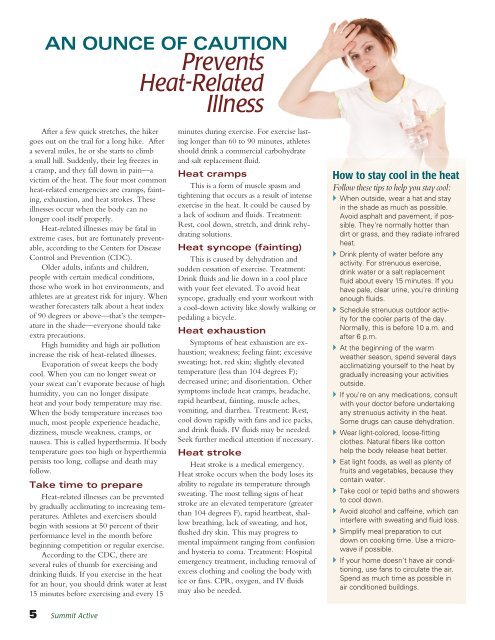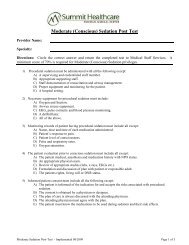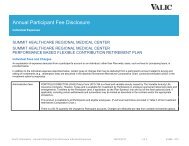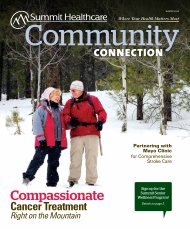active - Summit Healthcare
active - Summit Healthcare
active - Summit Healthcare
You also want an ePaper? Increase the reach of your titles
YUMPU automatically turns print PDFs into web optimized ePapers that Google loves.
AN OUNCE OF CAUTION<br />
Prevents<br />
Heat-Related<br />
Illness<br />
After a few quick stretches, the hiker<br />
goes out on the trail for a long hike. After<br />
a several miles, he or she starts to climb<br />
a small hill. Suddenly, their leg freezes in<br />
a cramp, and they fall down in pain—a<br />
victim of the heat. The four most common<br />
heat-related emergencies are cramps, fainting,<br />
exhaustion, and heat strokes. These<br />
illnesses occur when the body can no<br />
longer cool itself properly.<br />
Heat-related illnesses may be fatal in<br />
extreme cases, but are fortunately preventable,<br />
according to the Centers for Disease<br />
Control and Prevention (CDC).<br />
Older adults, infants and children,<br />
people with certain medical conditions,<br />
those who work in hot environments, and<br />
athletes are at greatest risk for injury. When<br />
weather forecasters talk about a heat index<br />
of 90 degrees or above—that’s the temperature<br />
in the shade—everyone should take<br />
extra precautions.<br />
High humidity and high air pollution<br />
increase the risk of heat-related illnesses.<br />
Evaporation of sweat keeps the body<br />
cool. When you can no longer sweat or<br />
your sweat can’t evaporate because of high<br />
humidity, you can no longer dissipate<br />
heat and your body temperature may rise.<br />
When the body temperature increases too<br />
much, most people experience headache,<br />
dizziness, muscle weakness, cramps, or<br />
nausea. This is called hyperthermia. If body<br />
temperature goes too high or hyperthermia<br />
persists too long, collapse and death may<br />
follow.<br />
Take time to prepare<br />
Heat-related illnesses can be prevented<br />
by gradually acclimating to increasing temperatures.<br />
Athletes and exercisers should<br />
begin with sessions at 50 percent of their<br />
performance level in the month before<br />
beginning competition or regular exercise.<br />
According to the CDC, there are<br />
several rules of thumb for exercising and<br />
drinking fluids. If you exercise in the heat<br />
for an hour, you should drink water at least<br />
15 minutes before exercising and every 15<br />
minutes during exercise. For exercise lasting<br />
longer than 60 to 90 minutes, athletes<br />
should drink a commercial carbohydrate<br />
and salt replacement fluid.<br />
Heat cramps<br />
This is a form of muscle spasm and<br />
tightening that occurs as a result of intense<br />
exercise in the heat. It could be caused by<br />
a lack of sodium and fluids. Treatment:<br />
Rest, cool down, stretch, and drink rehydrating<br />
solutions.<br />
Heat syncope (fainting)<br />
This is caused by dehydration and<br />
sudden cessation of exercise. Treatment:<br />
Drink fluids and lie down in a cool place<br />
with your feet elevated. To avoid heat<br />
syncope, gradually end your workout with<br />
a cool-down activity like slowly walking or<br />
pedaling a bicycle.<br />
Heat exhaustion<br />
Symptoms of heat exhaustion are exhaustion;<br />
weakness; feeling faint; excessive<br />
sweating; hot, red skin; slightly elevated<br />
temperature (less than 104 degrees F);<br />
decreased urine; and disorientation. Other<br />
symptoms include heat cramps, headache,<br />
rapid heartbeat, fainting, muscle aches,<br />
vomiting, and diarrhea. Treatment: Rest,<br />
cool down rapidly with fans and ice packs,<br />
and drink fluids. IV fluids may be needed.<br />
Seek further medical attention if necessary.<br />
Heat stroke<br />
Heat stroke is a medical emergency.<br />
Heat stroke occurs when the body loses its<br />
ability to regulate its temperature through<br />
sweating. The most telling signs of heat<br />
stroke are an elevated temperature (greater<br />
than 104 degrees F), rapid heartbeat, shallow<br />
breathing, lack of sweating, and hot,<br />
flushed dry skin. This may progress to<br />
mental impairment ranging from confusion<br />
and hysteria to coma. Treatment: Hospital<br />
emergency treatment, including removal of<br />
excess clothing and cooling the body with<br />
ice or fans. CPR, oxygen, and IV fluids<br />
may also be needed.<br />
How to stay cool in the heat<br />
Follow these tips to help you stay cool:<br />
When outside, wear a hat and stay<br />
in the shade as much as possible.<br />
Avoid asphalt and pavement, if possible.<br />
They're normally hotter than<br />
dirt or grass, and they radiate infrared<br />
heat.<br />
Drink plenty of water before any<br />
activity. For strenuous exercise,<br />
drink water or a salt replacement<br />
fluid about every 15 minutes. If you<br />
have pale, clear urine, you're drinking<br />
enough fluids.<br />
Schedule strenuous outdoor activity<br />
for the cooler parts of the day.<br />
Normally, this is before 10 a.m. and<br />
after 6 p.m.<br />
At the beginning of the warm<br />
weather season, spend several days<br />
acclimatizing yourself to the heat by<br />
gradually increasing your activities<br />
outside.<br />
If you're on any medications, consult<br />
with your doctor before undertaking<br />
any strenuous activity in the heat.<br />
Some drugs can cause dehydration.<br />
Wear light-colored, loose-fitting<br />
clothes. Natural fibers like cotton<br />
help the body release heat better.<br />
Eat light foods, as well as plenty of<br />
fruits and vegetables, because they<br />
contain water.<br />
Take cool or tepid baths and showers<br />
to cool down.<br />
Avoid alcohol and caffeine, which can<br />
interfere with sweating and fluid loss.<br />
Simplify meal preparation to cut<br />
down on cooking time. Use a microwave<br />
if possible.<br />
If your home doesn't have air conditioning,<br />
use fans to circulate the air.<br />
Spend as much time as possible in<br />
air conditioned buildings.<br />
5 <strong>Summit</strong> Active






